Wednesday - December 20, 2006
 A Counter-argument to the Rules of Engagement Meme A Counter-argument to the Rules of Engagement Meme
Instapundit
has linked to a blog misleadingly titled, the
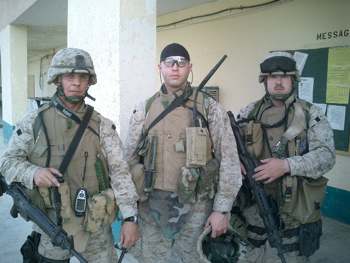 Captain's
Journal, concerning the military's Rules of
Engagement in the Iraqi theater. There are several myths being perpetuated,
with faulty analyses that combine to sow discontent among the people of this
nation and even people in the military. Sergeants and lance corporals surf the
internet and hear of these so-called problems and conclude that the ROE are
problematic.I want to address these
fallacies in a reasoned way from the perspective of someone who has been there
and knows what the ROE were one year ago. Although I don't think you need to
have been over there to understand the issues, I will state that I am a combat
veteran of the Hit-Haditha corridor in Al Anbar Province, Iraq from February to
October 2005. I served with the Third Battalion, 25th
Marines as the communications officer. Although I make no claim to
being a war hero, I was in all the battalion level operations and was on the
roads frequently. There are many, many who did a lot more than me, but I was
there and I'm very familiar with the subject.
First, I'll list the
fallacies.Fallacy #1. The ROE
are radically different than in past
wars.Fallacy #2. The ROE
are too restrictive and put our soldiers, sailors, airmen, and Marines in
danger.Fallacy #3. The
ROE are too
complicated.Fallacy #4.
If we change the ROE our troops will be able to act without fear of
harrassment.Fallacy #5.
If we change the ROE we will win the
war.All of these are fallacies,
but the first point to make is that the ROE are made by people who are in
theater, who see and do the actions defined in the rules, and who have a grave
sense of responsibility to the people entrusted to obey these rules. The
purpose of the ROE is to ensure that the coalition forces accomplish their
mission, and to ensure that force is employed consistent with our war aims and
the need to safeguard innocents. Captain's
Journal, concerning the military's Rules of
Engagement in the Iraqi theater. There are several myths being perpetuated,
with faulty analyses that combine to sow discontent among the people of this
nation and even people in the military. Sergeants and lance corporals surf the
internet and hear of these so-called problems and conclude that the ROE are
problematic.I want to address these
fallacies in a reasoned way from the perspective of someone who has been there
and knows what the ROE were one year ago. Although I don't think you need to
have been over there to understand the issues, I will state that I am a combat
veteran of the Hit-Haditha corridor in Al Anbar Province, Iraq from February to
October 2005. I served with the Third Battalion, 25th
Marines as the communications officer. Although I make no claim to
being a war hero, I was in all the battalion level operations and was on the
roads frequently. There are many, many who did a lot more than me, but I was
there and I'm very familiar with the subject.
First, I'll list the
fallacies.Fallacy #1. The ROE
are radically different than in past
wars.Fallacy #2. The ROE
are too restrictive and put our soldiers, sailors, airmen, and Marines in
danger.Fallacy #3. The
ROE are too
complicated.Fallacy #4.
If we change the ROE our troops will be able to act without fear of
harrassment.Fallacy #5.
If we change the ROE we will win the
war.All of these are fallacies,
but the first point to make is that the ROE are made by people who are in
theater, who see and do the actions defined in the rules, and who have a grave
sense of responsibility to the people entrusted to obey these rules. The
purpose of the ROE is to ensure that the coalition forces accomplish their
mission, and to ensure that force is employed consistent with our war aims and
the need to safeguard innocents.
Fallacy
#1. The
ROE are radically different than in past wars.
Militaries always have rules of engagement. They may not use the term, they may
not even write them down, but they are necessary. The ROE for the USMC on
Tarawa were essentially, kill everyone who is not on our side. The ROE for the
US Army in France and the Netherlands were probably essentially the same as what
we see now in Iraq. France, especially is a good analogy. In that case the
insurgency was on our side, but otherwise the problems of safeguarding the
civilian population while rooting out Germans and the very prevalent pro-German
French was complex. Go watch old re-runs of Vic Morrow and Rick Jason in the
television series "Combat!" and you'll often see cordon and searches very
similar to what the Marines are doing in Al Anbar. The enemy in Al Anbar is
nowhere near as well-trained or competent as the Wehrmacht but the ROE
requirements are largely the same. I know it's a stretch to use a tv show to
make a point, but the ideas are valid.
The basic idea is that whenever you
have a whole lot of people running around with loaded weapons in a place where
people are shooting at you, you need to have rules to control that violence that
you need to inflict or else there will be chaos.
Fallacy
#2. The ROE are too restrictive and put our soldiers, sailors, airmen, and
Marines in danger.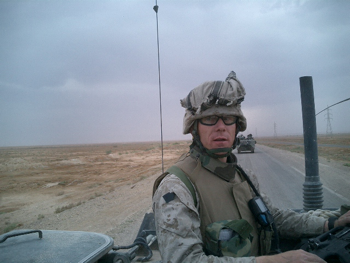 People making this
argument are generally ignorant of the content of the ROE. This is because the
ROE are classified. No one without a security clearance should have seen what
the full ROE are. In addition, the ROE change per circumstance and location.
Much has been made of a news
article claiming that "new" proposals to the ROE now put unit safety
above individual safety, and that commanders can locally limit the use of force
in self-defense. I am in no way
confirming or denying these claims, both because I wouldn't do so because the
ROE are usually classified, and also because I am not privy to these supposed
changes. People making this
argument are generally ignorant of the content of the ROE. This is because the
ROE are classified. No one without a security clearance should have seen what
the full ROE are. In addition, the ROE change per circumstance and location.
Much has been made of a news
article claiming that "new" proposals to the ROE now put unit safety
above individual safety, and that commanders can locally limit the use of force
in self-defense. I am in no way
confirming or denying these claims, both because I wouldn't do so because the
ROE are usually classified, and also because I am not privy to these supposed
changes.
But that being said, we can
still make an analysis of the claims. Unit safety is always first before
individual safety. This is always the case in any military unit. If individual
safety came first, our military would not be able to do anything because we'd be
hiding in big holes in the ground afraid to venture forth to accomplish any
mission whatsoever. Commanders always have the authority to order men to do
things that may get them killed, indeed they have the authority to order men to
do things that will almost certainly get them killed. There is nothing new to
this.
The second point that some units
may be allowed to limit the use of self-defense is also nothing new. I can
envision two scenarios where this may be necessary. First, as someone else
pointed out, when you deploy outposts forward of the main defensive positions,
the people in the outposts typically are told not to shoot and to get back to
the lines if they see trouble. The second point is that many areas of Iraq,
notably the green zone and the Kurdish north are, by report, largely safe. I've
never been to those areas so I don't have first hand knowlege of this. But
let's assume that this is true or will be true in the near future. This caveat
in the ROE allows commanders to limit the use of force among a population that
is largely peaceful. Just like in downtown Austin, Texas we don't allow the
military to shoot people, so in peaceful areas of Iraq or other places in the
area of operations of Central Command commanders should have the latitude to
limit the use of force. I would not expect any commander in Al Anbar Province
to adopt this policy. It is optional and situationally dependent.
Fallacy #3. The ROE are too
complicated.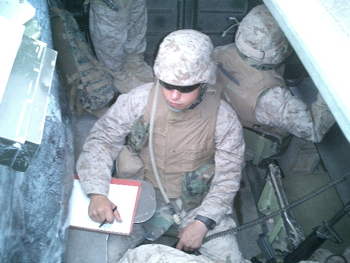 It is true that the ROE are
complex. They are written by lawyers and they are very long, I vaguely
recall
at least 50 pages, probably a lot longer. When I pointed this out to some
people as evidence that most people can't argue the merits of the ROE since they
haven't seen them, many people jumped to the conclusion that the rules are too
complex and unwieldly to expect anyone, especially Private Smith from small
town, USA to understand. The best
illustration of the incorrectness of that conclusion is to compare the ROE to
the rules of a sport. The rule book for the NFL is in the range of 200 pages,
and I don't have the time nor the inclination to count the pages in the Major
League Baseball rulebook. The important point is that I don't know
all those rules by heart, I probably don't even know a tenth of those rules.
But that doesn't stop me or anyone else from playing football or baseball
competently. If I'm a left guard, all I really need to know is that I keep
still until the ball is snapped, I stop the guys in the other colored shirts
from getting past me, and I can't hold the guy or hit him from behind when I do
that. I should know some more rules about fumbles and interceptions, but that's
about it. I don't need to know about roughing the kicker or the passer. I
don't need to know about touchbacks, or illegal pass protection. In baseball,
all I really need to know is to hit the ball when I'm at bat, and I have to do
that without exceeding three strikes, and a few other rules about fouls, and the
batting box. There's lots more out there, but that suffices for most people.
On defense, the most complicated rule is the infield fly rule, but otherwise
those volumes of rules are uninteresting and unnecessary for
me.The same is true for the ROE. If
you're in a mobile assault platoon, you need to know the rules for setting up a
snap vehicle checkpoint, and convoy protection for most days. If you're part of
an overwatch of an area, you need to know a few simple rules about what
constitutes behavior that marks someone as an enemy combatant, and that's about
it. These summaries are often put on small cards that easily fit in a breast
pocket. Anyone who can understand the infield fly rule can handle any of these
ROE quite easily. The same is true
for other jobs in the area of operations. Pilots have their rules. Battalion
commanders have much more rules. Just as coaches and umpires need to understand
more of the rules than the left guard, so commanders have to know more about the
rules that they must follow when employing the forces at their
disposal.Fallacy
#4. If we change the ROE our troops will be able to act without fear of
harrassment. It is true that the ROE are
complex. They are written by lawyers and they are very long, I vaguely
recall
at least 50 pages, probably a lot longer. When I pointed this out to some
people as evidence that most people can't argue the merits of the ROE since they
haven't seen them, many people jumped to the conclusion that the rules are too
complex and unwieldly to expect anyone, especially Private Smith from small
town, USA to understand. The best
illustration of the incorrectness of that conclusion is to compare the ROE to
the rules of a sport. The rule book for the NFL is in the range of 200 pages,
and I don't have the time nor the inclination to count the pages in the Major
League Baseball rulebook. The important point is that I don't know
all those rules by heart, I probably don't even know a tenth of those rules.
But that doesn't stop me or anyone else from playing football or baseball
competently. If I'm a left guard, all I really need to know is that I keep
still until the ball is snapped, I stop the guys in the other colored shirts
from getting past me, and I can't hold the guy or hit him from behind when I do
that. I should know some more rules about fumbles and interceptions, but that's
about it. I don't need to know about roughing the kicker or the passer. I
don't need to know about touchbacks, or illegal pass protection. In baseball,
all I really need to know is to hit the ball when I'm at bat, and I have to do
that without exceeding three strikes, and a few other rules about fouls, and the
batting box. There's lots more out there, but that suffices for most people.
On defense, the most complicated rule is the infield fly rule, but otherwise
those volumes of rules are uninteresting and unnecessary for
me.The same is true for the ROE. If
you're in a mobile assault platoon, you need to know the rules for setting up a
snap vehicle checkpoint, and convoy protection for most days. If you're part of
an overwatch of an area, you need to know a few simple rules about what
constitutes behavior that marks someone as an enemy combatant, and that's about
it. These summaries are often put on small cards that easily fit in a breast
pocket. Anyone who can understand the infield fly rule can handle any of these
ROE quite easily. The same is true
for other jobs in the area of operations. Pilots have their rules. Battalion
commanders have much more rules. Just as coaches and umpires need to understand
more of the rules than the left guard, so commanders have to know more about the
rules that they must follow when employing the forces at their
disposal.Fallacy
#4. If we change the ROE our troops will be able to act without fear of
harrassment.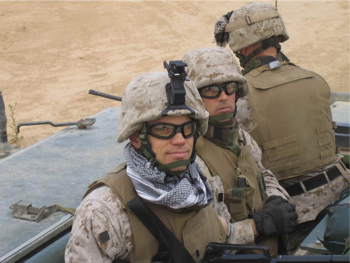 This is probably the real crux
of the issue that people have with the ROE. Whenever someone gets killed by our
forces and the circumstances warrant an investigation, people naturally become
fearful that the investigation will go badly for them and they can get in
trouble. Trouble from violating the ROE can be in the form of a formal or
informal counseling, up to jail time, or even execution. Knowing that there can
be very serious consequences naturally makes people apprehensive. But if you
examine the record, no one I am aware of has been prosecuted or convicted of
violating the ROE except in very extreme cases where the individuals lost
contact with the idea of being a human being, let alone an American, and
commited atrocious acts. Even the massacre
at Haditha is still pending prosecution, but I expect that it will
progress in that direction. In all other instances, the military has acted
consistent with the intent that actions taken that are reasonable to the
situation aren't punished. These are very liberal ROE when viewed in this
light.But what if we did decide that
somehow the ROE were too restrictive, and that there is some way to make them
more liberal? What would change? The CNN factor would be exactly the same.
That is, we know that Marines are able to defend themselves if they think they
or their unit is in danger unless someone makes special exceptions for the
situation. We have seen that a Marine in Fallujah can kill a man lying wounded
in a Mosque. The ROE supported his decision to kill that wounded man because he
had a reasonable concern that the wounded man was an enemy with a grenade and
was preparing to use it on him and his comrades. That Marine made the right
decision and the ROE and a team of lawyers supported his decision. Now let's
say that the ROE are changed so that it is even clearer that he can do what he
did. I'm not sure how it could be clearer, but let's say that there is some
spectrum past "allowed to shoot people when they are suspected of holding a
grenade" that we can somehow attain. What would happen
now?What would happen is that if a
cameraman is there and films the Marine shooting the wounded man in the Mosque,
that even though he is justified and even more allowed to do what he does, the
press will still be likely to put this incident in the press, either because
they support the enemy, or hate the war, or just because they think the issue
will increase viewer numbers. They might even have good intentions combined
with a quioxtic interest in publishing "truth," which seemed to be the case in
the real story. When that happens, it again will not matter that the Marine is
correct in his actions, what will matter is that hometown USA will see someone
writhing in pain on the floor of a Mosque getting killed. The pity factor will
cause many to recoil, and a big national debate can ensue. Thus, to protect the
Marine, the commander has to do a credible investigation. The investigation
will find that our fictitious new even more tolerant ROE allowed the killing and
nothing changes. You'd still have a Marine afraid of a very serious
investigation, and others will take that in and be likewise
affected.My point is that the ROE are
more than adequate, it's not the ROE that are the problem. The problem that
most people complaining about the ROE perceive is the reaction in the press that
causes investigations. These reactions have little to do with the
ROE.Fallacy
#5. If we change the ROE we will win the war. This is probably the real crux
of the issue that people have with the ROE. Whenever someone gets killed by our
forces and the circumstances warrant an investigation, people naturally become
fearful that the investigation will go badly for them and they can get in
trouble. Trouble from violating the ROE can be in the form of a formal or
informal counseling, up to jail time, or even execution. Knowing that there can
be very serious consequences naturally makes people apprehensive. But if you
examine the record, no one I am aware of has been prosecuted or convicted of
violating the ROE except in very extreme cases where the individuals lost
contact with the idea of being a human being, let alone an American, and
commited atrocious acts. Even the massacre
at Haditha is still pending prosecution, but I expect that it will
progress in that direction. In all other instances, the military has acted
consistent with the intent that actions taken that are reasonable to the
situation aren't punished. These are very liberal ROE when viewed in this
light.But what if we did decide that
somehow the ROE were too restrictive, and that there is some way to make them
more liberal? What would change? The CNN factor would be exactly the same.
That is, we know that Marines are able to defend themselves if they think they
or their unit is in danger unless someone makes special exceptions for the
situation. We have seen that a Marine in Fallujah can kill a man lying wounded
in a Mosque. The ROE supported his decision to kill that wounded man because he
had a reasonable concern that the wounded man was an enemy with a grenade and
was preparing to use it on him and his comrades. That Marine made the right
decision and the ROE and a team of lawyers supported his decision. Now let's
say that the ROE are changed so that it is even clearer that he can do what he
did. I'm not sure how it could be clearer, but let's say that there is some
spectrum past "allowed to shoot people when they are suspected of holding a
grenade" that we can somehow attain. What would happen
now?What would happen is that if a
cameraman is there and films the Marine shooting the wounded man in the Mosque,
that even though he is justified and even more allowed to do what he does, the
press will still be likely to put this incident in the press, either because
they support the enemy, or hate the war, or just because they think the issue
will increase viewer numbers. They might even have good intentions combined
with a quioxtic interest in publishing "truth," which seemed to be the case in
the real story. When that happens, it again will not matter that the Marine is
correct in his actions, what will matter is that hometown USA will see someone
writhing in pain on the floor of a Mosque getting killed. The pity factor will
cause many to recoil, and a big national debate can ensue. Thus, to protect the
Marine, the commander has to do a credible investigation. The investigation
will find that our fictitious new even more tolerant ROE allowed the killing and
nothing changes. You'd still have a Marine afraid of a very serious
investigation, and others will take that in and be likewise
affected.My point is that the ROE are
more than adequate, it's not the ROE that are the problem. The problem that
most people complaining about the ROE perceive is the reaction in the press that
causes investigations. These reactions have little to do with the
ROE.Fallacy
#5. If we change the ROE we will win the war.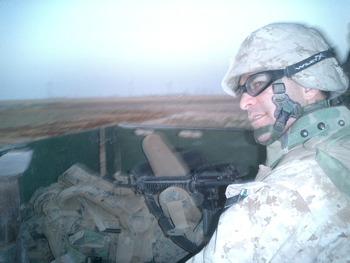 Changing the ROE will not allow a torrent of military actions that will end the
war. Some people are under the impression that changing the ROE will allow us
to kill more of the enemy. The truth is not that clear. With our pathetic
troop levels, it's very easy for the enemy to act with relative ease in almost
any location. For example, my battalion used two line companies and a weapons
company (about 500 Marines) to cover more than a hundred miles of the Euphrates
River along the well populated Hit-Haditha corridor. The best we could do most
of the time we were there was play whack-a-mole with the insurgents.
Later we got our third company
returned to us from defending the local air station and as we left to go home an
army battalion took control from us of Hit while our replacements took Haditha.
Each was augmented by one or more of the new Iraqi Army battalions. After we
left to go back to the United States the area was largely pacified by them to a
certain extent. This is pretty positive evidence that doubling the troops in
an area has a significant effect on enemy activity. Without an increase in
troop strength we cannot have the ability to find the enemy in enough quantity
to stop them, and we don't have the ability to stay and convince the locals that
they are safe. We already have authority from the ROE to kill or capture the
enemy when we find them, it's the finding part that is hardest. More permissive
ROE will not serve to help us be more places at more times to see enemy
preparations and actions.
Captions to
pictures:1. Gunnery Sergeant Fifer,
Communications Chief, Sergeant Arnold, Radio Watch Supervisor, Staff Sergeant
Kozar, Radio Chief preparing to go on an ad hoc foot patrol looking for an enemy
mortar team.
2. Gunnery Sergeant McIntire, Battalion
Gunner, riding in the command and control amtrac on the way into Operation
New Market.
Changing the ROE will not allow a torrent of military actions that will end the
war. Some people are under the impression that changing the ROE will allow us
to kill more of the enemy. The truth is not that clear. With our pathetic
troop levels, it's very easy for the enemy to act with relative ease in almost
any location. For example, my battalion used two line companies and a weapons
company (about 500 Marines) to cover more than a hundred miles of the Euphrates
River along the well populated Hit-Haditha corridor. The best we could do most
of the time we were there was play whack-a-mole with the insurgents.
Later we got our third company
returned to us from defending the local air station and as we left to go home an
army battalion took control from us of Hit while our replacements took Haditha.
Each was augmented by one or more of the new Iraqi Army battalions. After we
left to go back to the United States the area was largely pacified by them to a
certain extent. This is pretty positive evidence that doubling the troops in
an area has a significant effect on enemy activity. Without an increase in
troop strength we cannot have the ability to find the enemy in enough quantity
to stop them, and we don't have the ability to stay and convince the locals that
they are safe. We already have authority from the ROE to kill or capture the
enemy when we find them, it's the finding part that is hardest. More permissive
ROE will not serve to help us be more places at more times to see enemy
preparations and actions.
Captions to
pictures:1. Gunnery Sergeant Fifer,
Communications Chief, Sergeant Arnold, Radio Watch Supervisor, Staff Sergeant
Kozar, Radio Chief preparing to go on an ad hoc foot patrol looking for an enemy
mortar team.
2. Gunnery Sergeant McIntire, Battalion
Gunner, riding in the command and control amtrac on the way into Operation
New Market.
3. Lance Corporal Rasic, Data Technician,
serving as a radio operator in the command and control amtrac for operations in
Kubaysa.4. First Lieutenant Lobb,
Assistant Intelligence Officer, and Major Rentner, Communications Officer in the
command and control amtrac riding into
Haqlaniyah.5. Major St. Romain,
Intelligence Officer, leaving
Hit after Operation
Sword.
Go Back to the Start, Do Not Collect $200 Send me your two cents
|
|
